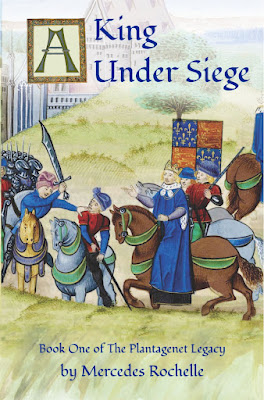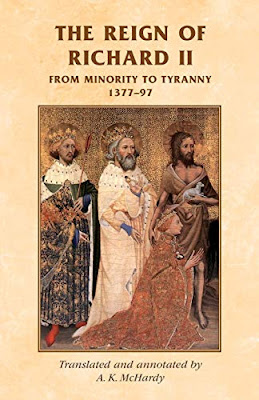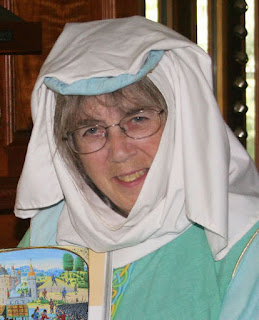Available from Amazon UK and Amazon US
Researching The Fourteenth Century
When I finished my SAXON EARLS series, I felt that I had thoroughly investigated the period—at least, as much as I could without reading Latin. My decision to jump forward three hundred years was a daunting one.
I essentially had to start over, for I only knew the basics of the period and much of my knowledge was gleaned from Shakespeare, my inspiration. Alas, Shakespeare was a dramatist, not a historian—no matter how much credence we give him! His play, RICHARD II was fabulous, but as it turns out it only covered the last three years of Richard's life. None of it had anything to do with my current novel.
By then, at least, I had a system. It took me a year of daily reading before I even began writing about Richard II. I've learned that the fat books (in page-length) are the best starting points. They give us a broad brush-stroke (like a landscape painting) and create the structure for the story. The huge books tend to be sparse on details.
This was certainly the case with Richard II. Nigel Saul wrote a big biography about him, but it was only a starting point. I discovered books by Charles Oman and Dan Jones about the Peasants' Revolt, which was pretty well documented. Then I stumbled across the "Manchester Medieval Sources Series"; this series gives us direct translations of chroniclers covering key events in several periods.
This one, annotated by A.K. McHardy, was entitled THE REIGN OF RICHARD II: FROM MINORITY TO TYRANNY 1377-97 (and it carried me into my next volume). Invaluable. It documented every single crisis in Richard's reign from the proverbial horse's mouth. Needless to say, this book is well-thumbed and I was very fortunate indeed to have access to it. This kind of reference material is very rare.
The chroniclers tended to disagree depending on their agendas. Thomas Walsingham, who composed the St. Alban's Chronicle and was a key source, was pro-Lancastrian and very definitely anti-Richardian. The Westminster Chronicle was pro-Richard, as he was a big donor. Some chroniclers wrote down their observations second or third-hand, while others may have been eye-witnesses; it's up to later historians to sort that out. As a result, I had to delve into academic articles to compare notes. I learned to pay close attention to footnotes; this is where I found most of my articles. These essays are specific to a particular subject, so the author puts every bit of knowledge into an event (including all contradictory source material).
If I'm lucky, I often find these articles online. JSTOR.org is a fabulous source; I pay $10 per month for a subscription and it's well worth it. Sometimes I have to pay for the article. Otherwise, they might be bound in a compilation such as Fourteenth Century Studies or The Fifteenth Century (in fifteen volumes) and can't be had elsewhere. These can get very expensive, and alas, sometimes each volume only has one or two articles I need. If I'm desperate enough, I'll bite the proverbial bullet and hope they will provide more help in future projects!
So over the course of a novel, I usually consume well over 30 history books and fill two loose-leaf binders full of articles. After I've run my course, I go back to the beginning and re-read much of the material to pick up stuff I missed the first time through. You just can't absorb it all when it's new. The reading never stops while I'm writing; occasionally I'll be able to insert something in my editing phase.
Each century has its definitive scholars. In late 14th-early 15th century England you absolutely must read Kenneth McFarlane; he opened up new scholarship on the period in the 40s and 50s. My favorite historian is Chris Given-Wilson, who did write a "fat" book about Henry IV. He also gives great background on the royal household and English nobility. Without the background, the history will fall flat.
Needless to say, if I'm not enamored with a subject, I'm not likely to write a novel about it. I would say I'm spending an average of two years thinking about and writing each book; with a series, I'm already researching one or even two books ahead. It helps foreshadow certain events. When I get to the end of a series, it's like falling off a cliff!
Mercedes Rochelle
# # #
About the Author
Mercedes Rochelle is an ardent lover of medieval history, and has channeled this interest into fiction writing. Her first four books cover eleventh-century Britain and events surrounding the Norman Conquest of England. The next series is called The Plantagenet Legacy about the struggles and abdication of Richard II, leading to the troubled reigns of the Lancastrian Kings. She also writes a blog: HistoricalBritainBlog.com to explore the history behind the story. Born in St. Louis, MO, she received by BA in Literature at the Univ. of Missouri St.Louis in 1979 then moved to New York in 1982 while in her mid-20s to “see the world”. The search hasn’t ended! Today she lives in Sergeantsville, NJ with her husband in a log home they had built themselves. Find out more from https://www.mercedesrochelle.com/ and find Mercedes on Facebook and Twitter @authorrochelle



Thank you so much for hosting the blog tour for A King Under Siege. We really appreciate all that you do for historical fiction authors.
ReplyDeleteAll the best,
Mary Anne
The Coffee Pot Book Club